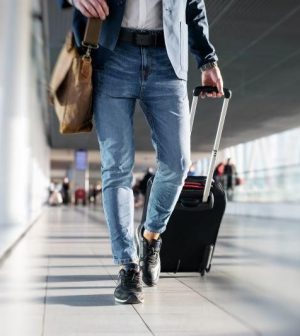- Could Your Grocery Store Meat Be Causing Recurring UTIs?
- Are You Making This Expensive Thermostat Error This Winter?
- Recognizing the Signs of Hypothyroidism
- 10 Strategies to Overcome Insomnia
- Could Artificial Sweeteners Be Aging the Brain Faster?
- Techniques for Soothing Your Nervous System
- Does the Water in Your House Smell Funny? Here’s Why
- Can a Daily Dose of Apple Cider Vinegar Actually Aid Weight Loss?
- 6 Health Beverages That Can Actually Spike Your Blood Sugar
- Treatment Options for Social Anxiety Disorder
New Year, New Travel: Stay Healthy on the Move

Travel can be fun, but taxing.
As the pandemic ebbs and people venture back out into the world, an expert from Baylor College of Medicine in Houston offers tips for ensuring a healthier, more peaceful vacation or work trip.
“Though frequent travel can boost your mood and positively impact your mental health, keep in mind that it’s a two-way street,” said Dr. Mike Ren, assistant professor of family and community medicine at Baylor. “While traveling, it is important to keep up your physical and mental well-being to maximize the beneficial effects of travel.”
Common symptoms of travel fatigue include trouble sleeping, feeling disengaged, having higher stress or anxiety levels, and overindulging in food or alcohol.
Someone might need to take a break from traveling to reset, if symptoms are severe. Ren suggests talking to a doctor about whether a pause is needed or if symptoms don’t resolve.
“An ounce of prevention is worth a pound of cure. Make sure you are up to date on all your vaccinations, particularly for international travel, and if you are on prescription medications, make sure you have an adequate supply for travel and a few days upon return,” Ren said in a Baylor news release.
“Make sure to maintain a good level of hygiene by washing your hands often and take advantage of telehealth visits while traveling if symptoms or medical concerns arise,” he added.
One issue with travel is that jet lag and different time zones may impact sleep. With good supplements and habits, sleep won’t be lost. Fix jet lag by adjusting sleeping and eating schedules to local times.
Put away smartphones 30 minutes before bed and make sure your sleeping environment is cool and comfortable. Drink plenty of water to stay hydrated while avoiding alcohol and caffeine, Ren advised.
Use a sleep mask and earplugs if these other measures don’t help. Taking melatonin supplements can be used to help fall asleep. Some find calming scents, such as lavender, to be helpful.
Stay active during your trip by walking and adventuring, Ren suggested. You can do body weight exercises first thing in the morning so they are not forgotten about later in the day. Exercise apps and athletic equipment that easily travels, like jump ropes or exercise bands, can help you keep up your routine.
“If you have an active day of walking, biking or hiking, you shouldn’t feel guilty about skipping a workout,” Ren said.
It’s also possible to maintain a balanced diet while trying out new cuisines by making good decisions about where to eat.
“Whenever possible, choose food options that come with plenty of fresh fruits and vegetables,” Ren said. “If restaurants have limited healthy options, try preparing your own meal here and there. Stock up on fresh, healthy ingredients and make easy meals, such as salads and sandwiches. Nuts and fruits make great snacks when you’re on the move.”
Food safety is also important while traveling.
“Be sure to consume foods that are prepared properly, like only eating meat that is thoroughly cooked and avoiding tap water, unless you are certain it is safe to drink. Be wary of raw foods and products sold by street vendors,” Ren warned.
Care for your mental health by bringing items that remind you of home and keeping in contact with support systems to ease feelings of anxiety. Exercise can also help with this.
Schedule an appointment with a health care provider if you have more intense mental health concerns, Ren advised. Also talk to your doctor about destination-specific vaccines, medication refills and any concerns that may be causing anxiety.
More information
The U.S. Centers for Disease Control and Prevention offers more tips on safe and healthy travel.
SOURCE: Baylor College of Medicine, news release, Jan. 5, 2023
Source: HealthDay
Copyright © 2026 HealthDay. All rights reserved.










